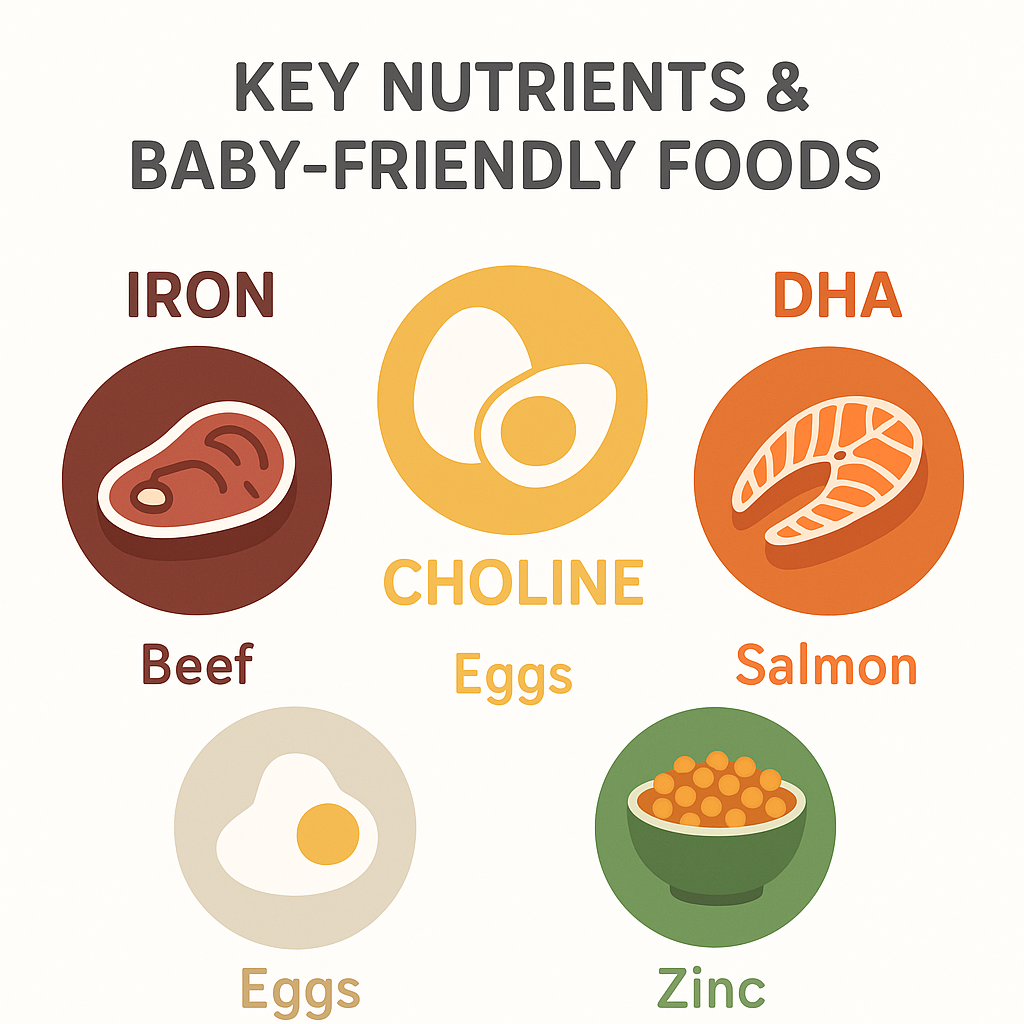Did you know a single egg provides 98% of your baby’s daily choline, a critical nutrient for memory and neural connections? From 6–12 months, your baby’s brain forms up to 1 million neural connections per second, and the foods you offer shape learning, memory, and focus. Fascinatingly, gut microbiota—nurtured by foods like yogurt—also influence cognitive growth by supporting the gut-brain axis. The bites you offer during this time can shape their learning, memory, and focus for life.
- Why does what your baby eats between 6–12 months matter so much?
- Which nutrients drive baby brain development (and what do they do)?
- What are the best first foods for building a sharper baby brain?
- How can you safely introduce these brain-boosting foods?
- Looking for budget-friendly or cultural alternatives parents rarely hear about?
- What if my baby refuses these foods?
- Your quick-fire questions, answered
- How today’s food choices shape tomorrow’s milestones
Why does what your baby eats between 6–12 months matter so much?
The period from 6 to 12 months marks a pivotal stage in a baby’s life, characterized by rapid physical and cognitive development. Research, such as from UNICEF Parenting: Feeding your baby: 6–12 months, highlights that babies need more energy and nutrients during this time than at any other stage for healthy growth, strength, and “smart” development. By age 5, 90% of brain volume is established, making this post-natal growth spurt uniquely sensitive to diet quality, as noted in the initial article. Nutrients from food become the raw material for neurons, synapses, and the neural “wiring” that powers language acquisition and problem-solving.
This stage is also when babies transition from relying solely on breastmilk or formula to incorporating solid foods. The CDC, in their guide - CDC: When, What, and How to Introduce Solid Foods, recommends starting solids around 6 months, not before 4 months, to ensure developmental readiness. This transition is crucial because, as iron stores from birth deplete around 6 months, food becomes the primary source of brain-critical nutrients like iron, zinc, DHA, and choline, bridging gaps while breastmilk or formula provides baseline fuel.
For more on milk’s role in this sprint, see How Breastfeeding Boosts Your Baby’s Cognitive Growth.

Which nutrients drive baby brain development (and what do they do)?
Specific nutrients play a significant role in supporting infant cognitive development, particularly during this rapid growth phase. According to UCLA Health: Baby brain food: 7 foods to fuel brain development 7 foods to fuel brain development, the brain forms up to 1 million neural connections per second between 6–12 months, underscoring the need for nutrient-dense foods. Here are the key nutrients and their roles, supported by evidence:
- Iron: Essential for delivering oxygen to brain cells, iron deficiency is linked to attention and memory delays. Sources include beef, spinach, and iron-fortified cereals, with the AAP recommend iron-rich foods like strained meats or beans starting between 4–6 months, as per Earth’s Best: Essential Brain-Boosting Nutrients for Baby.
- Choline: Helps encode memories and build cell membranes; a single egg provides 98% of a baby’s daily choline needs, crucial for neural connections.
- DHA (Omega-3): Keeps cell membranes flexible and speeds neural signals, found in fatty fish like salmon, with recommendations for 2 servings weekly to meet needs, as noted in Parents.com: The Most Important Nutrients for Your Baby’s Brain.
- Iodine: Regulates neuron growth via thyroid hormones, found in yogurt and dairy products.
- Zinc: Supports neuronal signaling and DNA synthesis, available in meats, beans, and lentils.
These nutrients are vital because inadequate nutrition during the first two years, especially 6–12 months, is linked to lower IQ, behavior problems, and less school success
Supporting details and food lists appear in DHA and Omega-3: Why They’re Key for Your Baby’s Brain and Iron Deficiency in Babies.

What are the best first foods for building a sharper baby brain?
Between 6–12 months, your baby’s brain is developing rapidly, forming up to one million neural connections per second. The best first foods to support this growth are nutrient-dense options that provide key brain-building nutrients like iron, choline, DHA (an omega-3 fatty acid), zinc, iodine, and folate as per When, What, and How to Introduce Solid Foods. Here are the top recommendations:
- Eggs: A single egg provides 98% of your baby’s daily choline needs, essential for memory and neural connections. They also offer protein and vitamin B12.
- Fatty fish (e.g., salmon, sardines): Rich in DHA, which supports brain cell membrane flexibility and speeds neural signaling. Aim for 1 ounce of low-mercury fish 2-3 times a week.
- Iron-rich meats (e.g., beef, chicken): Provide heme iron, which is easily absorbed, and zinc, crucial for neuronal signaling. Iron deficiency can delay attention and memory.
- Beans and lentils: Excellent plant-based sources of zinc, iron, protein, folate, and choline. Pair with vitamin-C-rich foods (like citrus) to enhance iron absorption.
- Avocado: Contains healthy unsaturated fats similar to those in breast milk, supporting brain cell structure.
- Full-fat plain yogurt: Provides iodine (for thyroid hormone regulation), protein, and live cultures that support the gut-brain axis.
- Leafy greens (e.g., spinach, kale): High in folate (for brain cell division) and iron. Blend into purees or mix into other foods.
- Nuts and seeds (in safe forms like nut butters): Offer healthy fats, zinc, and protein. Avoid whole nuts due to choking risks.
- Blueberries and other berries: Packed with antioxidants that protect brain cells from oxidative stress. Whole grains (e.g., oatmeal): Provide energy and fiber, supporting overall growth and cognitive function.
These foods should be introduced as smooth purees initially (around 6-8 months), then progressed to mashed or lumpy textures (8-10 months), and finally soft finger foods (10-12 months) as per BabyCenter: Age-by-age guide to feeding your baby.
Need recipe inspiration? Visit 10 Brain-Boosting Foods for Babies and Toddlers.
How can you safely introduce these brain-boosting foods?
Introducing solids is a critical step, so it’s important to do it safely and effectively. The AAP, in their guidelines Infant Food and Feeding, recommends the following safe ways to introduce food to babies:
- Start when your baby shows signs of readiness, typically around 6 months, such as sitting up with minimal support, good head control, and showing interest in food (e.g., reaching for it).
- Begin with single-ingredient smooth purees, then gradually introduce mashed and lumpy foods, and finally soft finger foods.
- Introduce one new food at a time, waiting 3-5 days to monitor for allergies.
- Offer a variety of foods to ensure a broad spectrum of nutrients, and avoid choking hazards like whole nuts, popcorn, honey, and high-mercury fish.
- For allergens like eggs, peanuts, and fish, introduce them early (before 12 months) to reduce allergy risk, but consult a pediatrician if there are risk factors like severe eczema or existing food allergies.
- Safety watch: skip honey, whole nuts, popcorn, and high-mercury fish; see Toxins in Baby Food for contaminant tips.
Looking for budget-friendly or cultural alternatives parents rarely hear about?
Not all brain-boosting foods need to be expensive or exotic. Some budget-friendly options include:
- Canned, low-sodium salmon ($3 can) mashed with avocado.
- Frozen spinach stirred into lentil soup.
- Black-eyed peas (West Africa), dal with rice (South Asia), or steamed yucca (Latin America) for iron and folate.
- Fermented soy (natto) offers choline and emerging vitamin K2 benefits.
- Vegan families can rely on iron-fortified oat cereal plus algal-oil DHA drops—see 7 Essential Nutrients for Your Baby’s Brain (and Food Sources).
These alternatives can help meet nutritional needs while being cost-effective or culturally relevant.
What if my baby refuses these foods?
Refusal is normal; most babies need 8–10 relaxed exposures before accepting a new taste.
- Pair bitter greens with sweet potato or breast milk for familiarity.
- Encourage sensory play—let baby smear, squish, and explore.
- Model enjoyment by eating the same foods yourself.
- Track growth; consistent refusals plus slowed weight gain call for a pediatric or feeding-therapy consult.
- Compare homemade and pouch options in Homemade vs. Store-Bought Baby Food.
These challenges, if not addressed, can lead to nutritional gaps that affect future cognitive and physical milestones.
Your quick-fire questions, answered
-
How often should I serve fish to my 8-month-old?
Offer 1 oz of low-mercury fish twice a week. Salmon, sardines, or cod meet DHA needs without mercury worries. -
Can vegetarian babies meet iron goals without meat?
Yes—if you combine iron-fortified cereal, lentils, tofu, and vitamin C fruit, and monitor levels with your pediatrician. -
Is store-bought pouch food okay?**
In moderation. Pick options with ≤ 5 g added sugar and added iron; rotate with fresh foods for texture learning. -
Do I need DHA drops if I’m breastfeeding?
Only if you rarely eat oily fish. Your milk reflects your diet, so discuss supplements with your provider.
How today’s food choices shape tomorrow’s milestones
The consequences of today’s food choices during pregnancy, breastfeeding practices, and the introduction of complementary foods, are foundational to shaping tomorrow’s infant developmental milestone. Research suggests that a nutrient-rich diet, through breastfeeding and diverse, nutrient-dense complementary feeding, supports cognitive, motor, and social-emotional development.
However, nutrient deficiencies and poor dietary practices can lead to delays and long-term health risks. The global efforts like UNICEF aims to improve nutrition and support healthy development. Malnutrition cause stunted growth, weakened immunity, or delayed milestones, while overnutrition lead to obesity and related challenges.
Research, such as from Nutritional Influences on Brain Development - PMC, shows that early postnatal growth, before 12 months, predicts child IQ at age 9, with linear growth rate and infant weight before this period being key determinants.
Poor food choices make it harder for them to stay healthy or reach milestones. Every bite today helps build a better tomorrow for the baby!